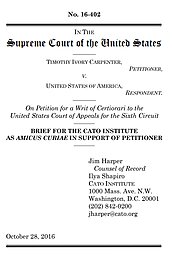Learn more about Cato’s Amicus Briefs Program.
Timothy Carpenter and Timothy Sanders were convicted in U.S. District Court on charges stemming from a string of armed robberies in and around the Detroit area. They appealed on the ground that the government had acquired detailed records of their movements (“cell site location information” or “CSLI”) from their wireless carriers in violation of the Fourth Amendment. The U.S. Court of Appeals for the Sixth Circuit turned their appeal aside, finding that “[t]he government’s collection of business records containing these data … is not a search.”
The Fourth Amendment states that “[t]he right of the people to be secure in their persons, houses, papers, and effects, against unreasonable searches and seizures, shall not be violated.” Presumably, when called upon to determine whether a Fourth Amendment violation has occurred, courts would analyze the elements of this language as follows: Was there a search? Was there a seizure? Was any such search or seizure of “their persons, houses, papers, [or] effects”? Was any such search or seizure reasonable? And in cases involving familiar physical objects, they usually do. However, in harder cases dealing with unfamiliar items such as communications and data, courts retreat to “reasonable expectation of privacy” doctrine that emerged from Katz v. United States, 389 U.S. 347 (1967).
It was the Katz “reasonable expectation of privacy” test that the Sixth Circuit relied upon when it determined that the government can require a third party like a cellular telecommunications provider to turn highly revealing information over to law enforcement officers without a warrant, even though contracts and regulation give property rights in the data to the customer. Over-reliance on constitutional doctrine has blinded the court to what the Fourth Amendment actually says.
The Cato Institute has filed an amicus brief urging the Supreme Court to take up this case, so it can revise Fourth Amendment practice to more closely adhere to the language of the Fourth Amendment. Consistent with precedents both longstanding and recent, the Court should find that communications and data are items that can be seized and searched. The Court should recognize that telecommunications customers can have property rights in such data, and that when the government seeks to seize and search such data, it generally requires a warrant. This will permit courts below to address seizures and searches of communications and data forthrightly, confidently assessing the reasonableness of government searches and seizures even when communications and data are involved.


